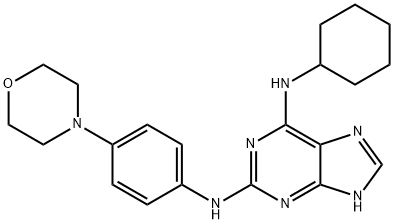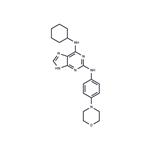Description
Reversine is a 2,6-disubstituted purine derivative that was originally found to induce dedifferentiation of C2C12 culture myoblast cells into stem cell progenitors when used at a concentration of 5 μM for four days. Depending on cell type, reversine promotes either differentiation or dedifferentiation. For example, in NT2 neuronal and HL-60 human promyelocytic leukemia cells, it induces differentiation. It inhibits the Aurora A, B, and C kinases with IC
50 values of 98-876 nM and acts as an antagonist at the adenosine A
3 receptor with a K
i value of 0.66 μM. Reversine is also used for studies of chromosome segregation. It inhibits the mitotic spindle checkpoint enzyme MPS1 with IC
50 values of 6 and 2.8 nM for its kinase domain and full-length version, respectively). Reversine induces autophagy in WRO human follicular thyroid cancer cells and decreases Akt/mTOR signaling.
Uses
Reversine acts as a potent human A3 adenosine receptor antagonist and pan-aurora A/B/C kinase inhibitor. Used for stem cell differentiation.
Definition
ChEBI: A member of the class of purines that is 9H-purine in which the hydrogens at positions 2 and 6 are replaced by a [4-(morpholin-4-yl)phenyl]nitrilo group and a cyclohexylamino group, respectively.
Biochem/physiol Actions
Reversine was first described as a synthetic substituted purine with activity as a dedifferentiation agent; it was shown to induces differentiated lineage-committed cells to become multipotent mesenchymal stem cells (MSCs). Reversine has also been show to have activity as a potent, selective human A3 adenosine receptor antagonist (Ki value of 0.66 μM), as an ATP-competitive Aurora kinase inhibitor, and as a Mps1 kinase inhibitor. Additionally, studies have shown reversine to be an anti-cancer agent, inhibiting growth and inducing cell death in various cancer cell types.
in vitro
reversine could be used to induce dedifferentiation of murine myoblasts. previous reports also showed that reversine had a role in regeneration. moreover, a recent report indicated reversine had anti-tumor capabilities for a myeloma cell line, as demonstrated by that reversine could suppress the expression of cell cycle related proteins aurora kinase a and aurora kinase b [1].
in vivo
the effects of reversine on tumor weight and volume were assessed using a murine model of cervical cancer with u14 cells, separately or combined with aspirin. the inhibition rate of cells in the combination group significantly increased; moreover, such combination could synergistically inhibit the proliferation of five cervical cancer cell lines. in the mouse model, tumor weight and volume of cervical cancer bearing mice were more reduced [1].
IC 50
150, 500 and 400 nm for aurora kinase a, b and c respectively
References
1) Chen et al. (2004), Dedifferentiation of lineage-committed cells by a small molecule; J. Am. Chem. Soc., 126 410
2) Chen et al. (2007), Reversine increases the plasticity of lineage-committed mammalian cells; Proc. Natl. Acad. Sci. USA, 104 10482
3) Perreira et al. (2005), Reversine and its 2-substituted adenine derivatives as potent and selective A3 adenosine receptor antagonists; J. Med. Chem., 48 4910



